- Clone
- 16A (See other available formats)
- Regulatory Status
- RUO
- Other Names
- Mucin-1, MUC-1, Episialin, HMFG antigen, MAM6
- Isotype
- Mouse IgG1, λ
- Barcode Sequence
- CCGAATAATTTCAGC
- Ave. Rating
- Submit a Review
- Product Citations
- publications
Mucin-1 (MUC-1), cell surface associated or polymorphic epithelia mucin, is a 500-1000 kD proteoglycan expressed by activated T cells, mucosal epithelial cells, and aberrantly expressed on most breast cancers. In normal cells, CD227 is heavily glycosylated, whereas in cancerous cells, the glycosylation is incomplete and premature sialation is also observed. The protein is anchored to the apical surface of the epithelial cell and functions as a lubricant to keep the cell hydrated and to protect against pathogens. It can also function as a signaling molecule by forming a MUC-1/SOS1/GrB2 complex. MUC-1 can interact with cancer antigens such as Her2/neu.
Product DetailsProduct Details
- Verified Reactivity
- Human
- Antibody Type
- Monoclonal
- Host Species
- Mouse
- Immunogen
- Jurkat cells transfected with MUC1
- Formulation
- Phosphate-buffered solution, pH 7.2, containing 0.09% sodium azide and EDTA
- Preparation
- The antibody was purified by chromatography and conjugated with TotalSeq™-D oligomer under optimal conditions.
- Concentration
- 0.5 mg/mL
- Storage & Handling
- The antibody solution should be stored undiluted between 2°C and 8°C. Do not freeze.
- Application
-
PG - Quality tested
- Recommended Usage
-
Each lot of this antibody is quality control tested by immunofluorescent staining with flow cytometric analysis and the oligomer sequence is confirmed by sequencing. TotalSeq™-D antibodies are compatible with Mission Bio’s Tapestri Single-Cell Sequencing Platform for simultaneous detection of DNA and Protein.
To maximize performance, it is strongly recommended that the reagent be titrated for each application, and that you centrifuge the antibody dilution before adding to the cells at 14,000xg at 2 - 8°C for 10 minutes. Carefully pipette out the liquid avoiding the bottom of the tube and add to the cell suspension. For Proteogenomics analysis, the suggested starting amount of this reagent for titration is ≤ 1.0 µg per million cells in 100 µL volume. Refer to the corresponding TotalSeq™ protocol for specific staining instructions.
Buyer is solely responsible for determining whether Buyer has all intellectual property rights that are necessary for Buyer's intended uses of the BioLegend TotalSeq™ products. For example, for any technology platform Buyer uses with TotalSeq™, it is Buyer's sole responsibility to determine whether it has all necessary third party intellectual property rights to use that platform and TotalSeq™ with that platform. - Application Notes
-
This clone shows stronger binding to the glycosylated compared to the non-glycosylated peptide1.
- Additional Product Notes
-
TotalSeq™-D reagents are designed to profile protein expression at single cell level. The Mission Bio Tapestri platform and sequencer (e.g. Illumina analyzers) are required. Please contact technical support for more information, or visit biolegend.com/totalseq/single-cell-dna
The barcode flanking sequences are CGAGATGACTACGCTACTCATGG (PCR handle), and GAGCCGATCTAGTATCTCAGT*C*G (capture sequence). * indicates a phosphorothioated bond, to prevent nuclease degradation.
View more applications data for this product in our Application Technical Notes. -
Application References
(PubMed link indicates BioLegend citation) -
- Song W, et al. 2012. Int. J Oncol. 41:1977. PubMed
- RRID
-
AB_2927932 (BioLegend Cat. No. 355609)
Antigen Details
- Structure
- 500-1000 kD proteoglycan (glycosylated form)
- Distribution
-
Activated T cells, mucosal epithelial cells, aberrantly expressed in most breast cancers
- Interaction
- Complexes with SOS1 and Grb2 in RAS signaling
- Ligand/Receptor
- ICAM-1 and Her2/neu (ErbB2)
- Cell Type
- Dendritic cells, Epithelial cells, T cells
- Biology Area
- Immunology, Innate Immunity
- Molecular Family
- CD Molecules
- Antigen References
-
1. Gendler SJ. 2001. J. Mammary Gland Biol. Neoplasia. 6:339.
2. Agrawal B, et al. 1998. Cancer Res. 58:4079.
3. Rahn JJ, et al. 2004. J. Biol. Chem. 279:29386. - Gene ID
- 4582 View all products for this Gene ID
- UniProt
- View information about CD227 on UniProt.org
Related FAQs
Other Formats
View All CD227 Reagents Request Custom Conjugation| Description | Clone | Applications |
|---|---|---|
| PE anti-human CD227 (MUC-1) | 16A | FC |
| Purified anti-human CD227 (MUC-1) | 16A | FC,ICC,IHC-P |
| PE/Cyanine7 anti-human CD227 (MUC-1) | 16A | FC |
| APC anti-human CD227 (MUC-1) | 16A | FC |
| TotalSeq™-D1250 anti-human CD227 (MUC-1) | 16A | PG |
| TotalSeq™-A1250 anti-human CD227 (MUC-1) | 16A | PG |
| TotalSeq™-B1250 anti-human CD227 (MUC-1) | 16A | PG |
| Brilliant Violet 421™ anti-human CD227 (MUC-1) | 16A | FC |
| Brilliant Violet 711™ anti-human CD227 (MUC-1) | 16A | FC |
| Brilliant Violet 785™ anti-human CD227 (MUC-1) | 16A | FC |
| TotalSeq™-C1250 anti-human CD227 (MUC-1) | 16A | PG |
| TotalSeq™-Bn1250 anti-human CD227 (MUC-1) | 16A | SB |
Compare Data Across All Formats
This data display is provided for general comparisons between formats.
Your actual data may vary due to variations in samples, target cells, instruments and their settings, staining conditions, and other factors.
If you need assistance with selecting the best format contact our expert technical support team.
-
PE anti-human CD227 (MUC-1)
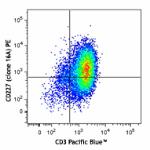
PHA-activated human peripheral blood lymphocytes (3 days) we... 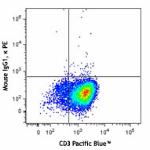
-
Purified anti-human CD227 (MUC-1)
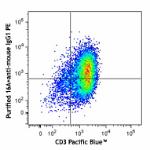
PHA-activated human peripheral blood lymphocytes (3 days) we... 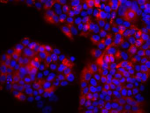
BT474 breast cancer cell line was stained with anti-human CD... 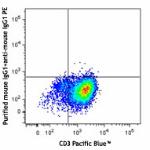

IHC staining using purified anti-MUC1 antibody (clone 16A) o... -
PE/Cyanine7 anti-human CD227 (MUC-1)

PHA-stimulated (3-days) human peripheral blood mononuclear c... -
APC anti-human CD227 (MUC-1)
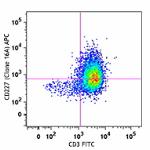
PHA-stimulated (3-days) human peripheral blood mononuclear c... 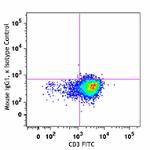
-
TotalSeq™-D1250 anti-human CD227 (MUC-1)
-
TotalSeq™-A1250 anti-human CD227 (MUC-1)
-
TotalSeq™-B1250 anti-human CD227 (MUC-1)
-
Brilliant Violet 421™ anti-human CD227 (MUC-1)

PHA-stimulated (3-days) human peripheral blood mononuclear c... -
Brilliant Violet 711™ anti-human CD227 (MUC-1)

PHA-stimulated (3-days) human peripheral blood mononuclear c... -
Brilliant Violet 785™ anti-human CD227 (MUC-1)

PHA-stimulated (3-days) human peripheral blood mononuclear c... -
TotalSeq™-C1250 anti-human CD227 (MUC-1)
-
TotalSeq™-Bn1250 anti-human CD227 (MUC-1)













Follow Us